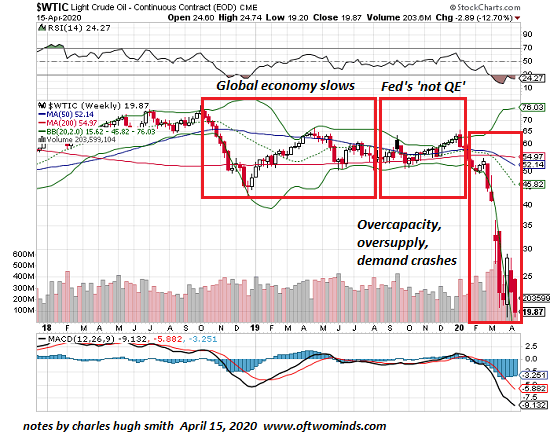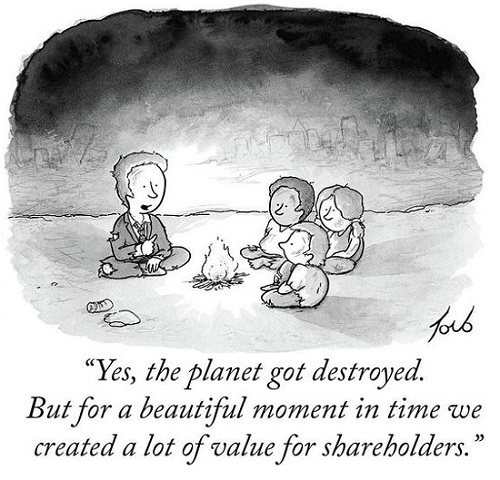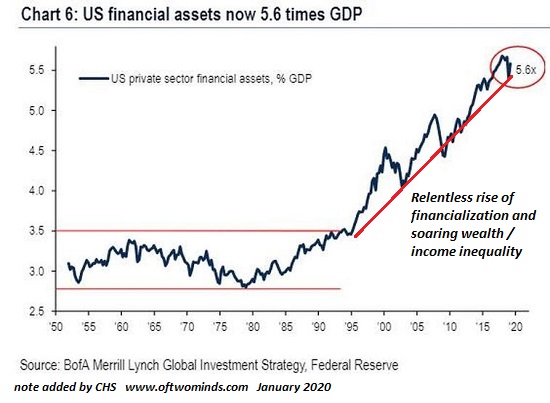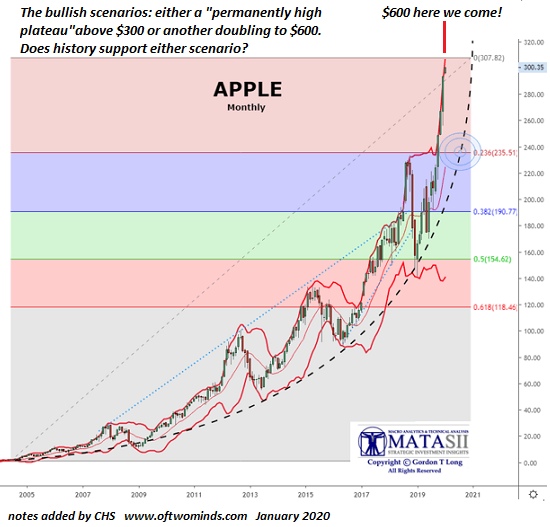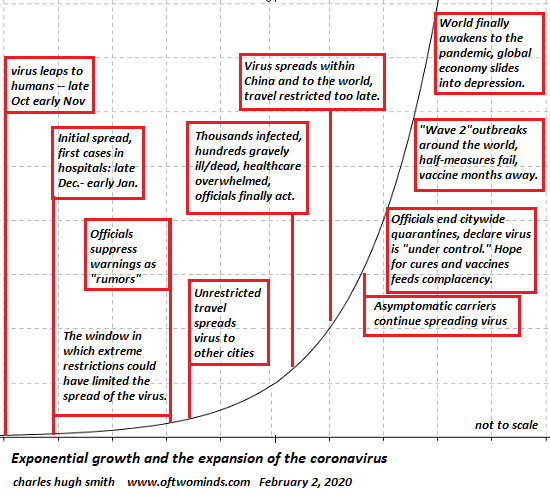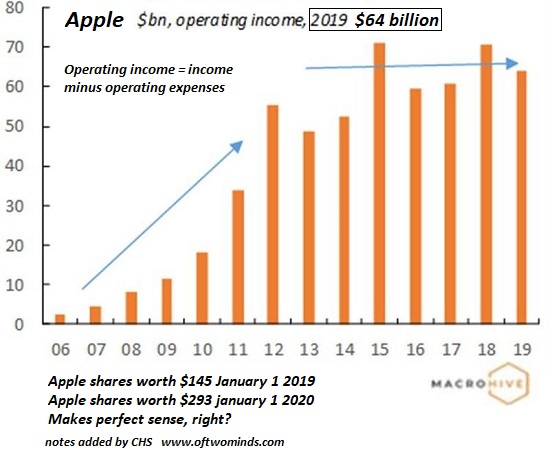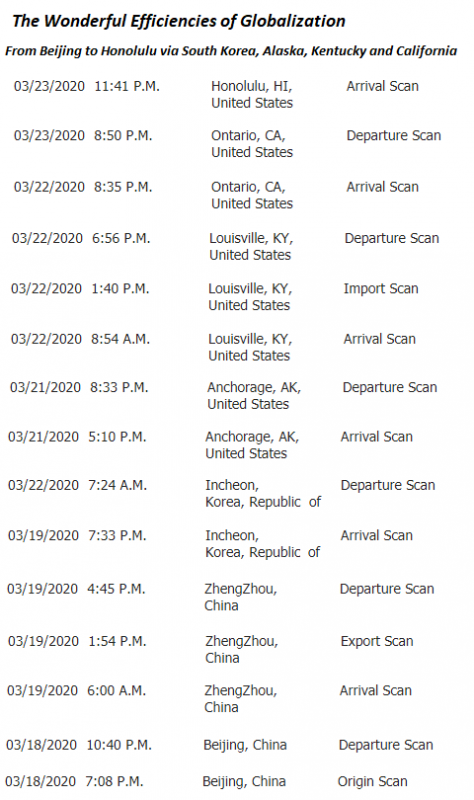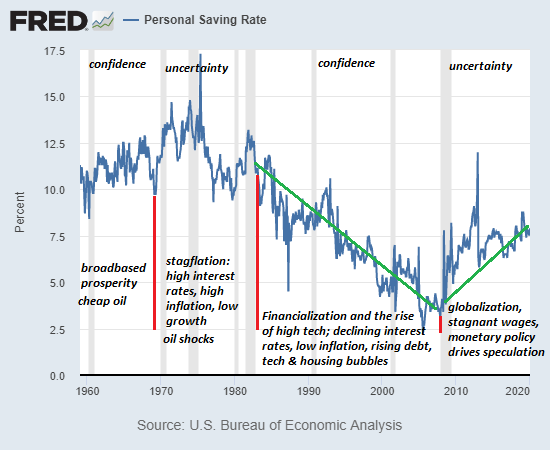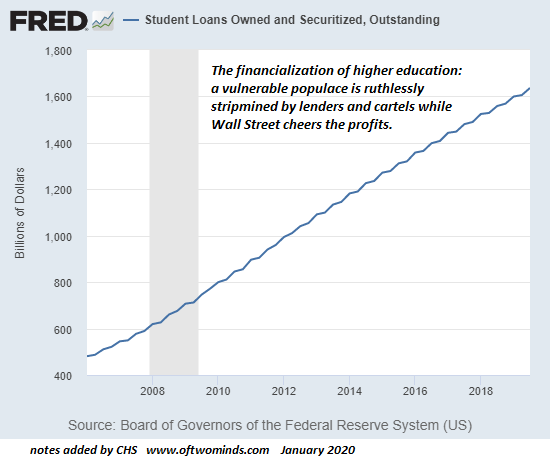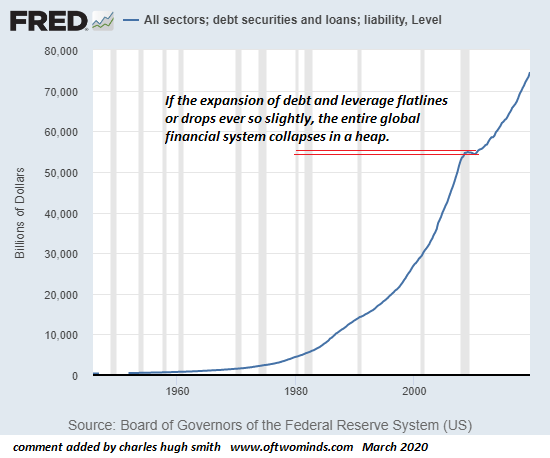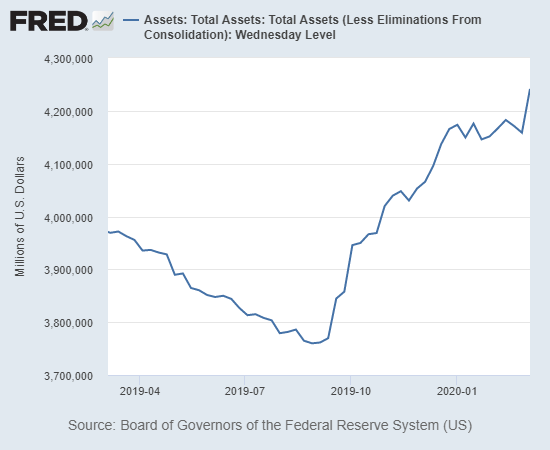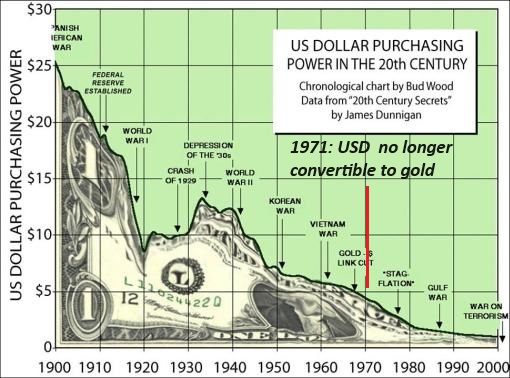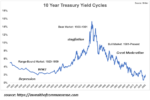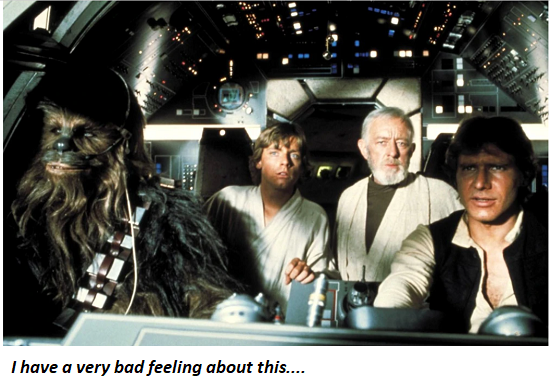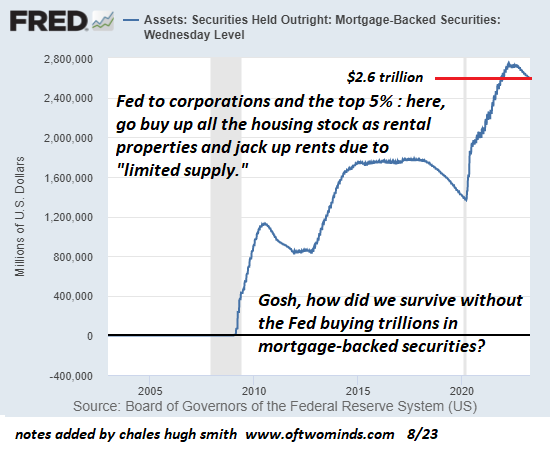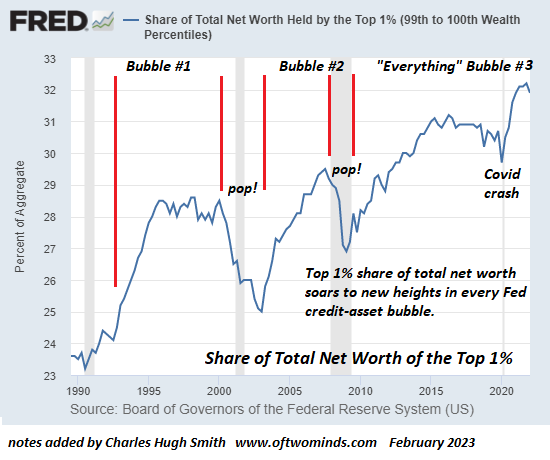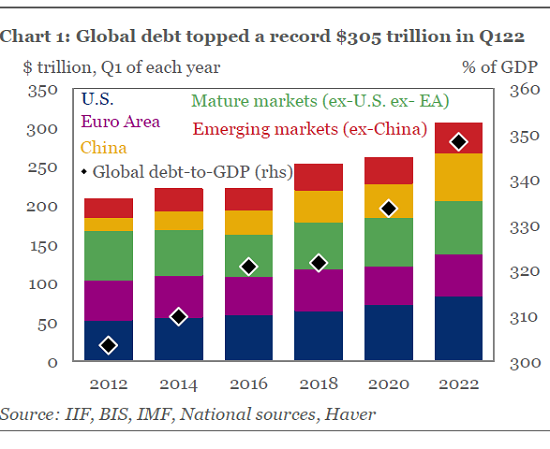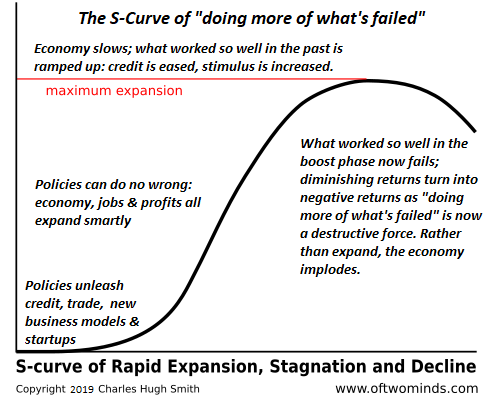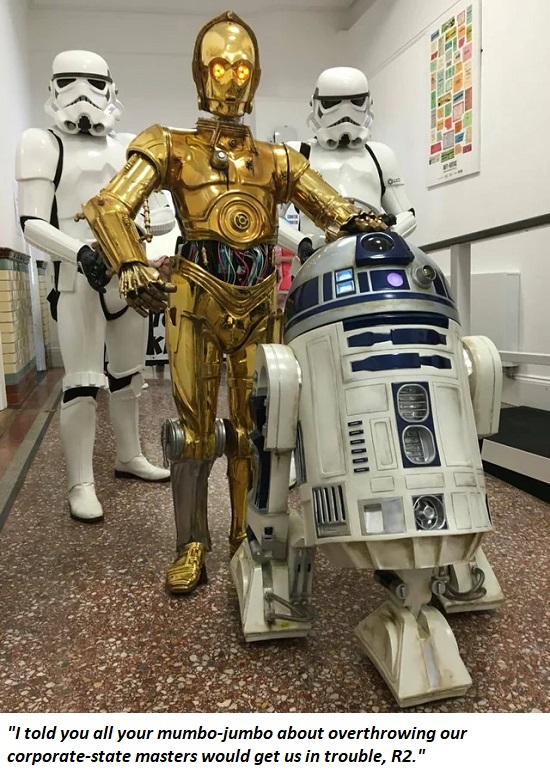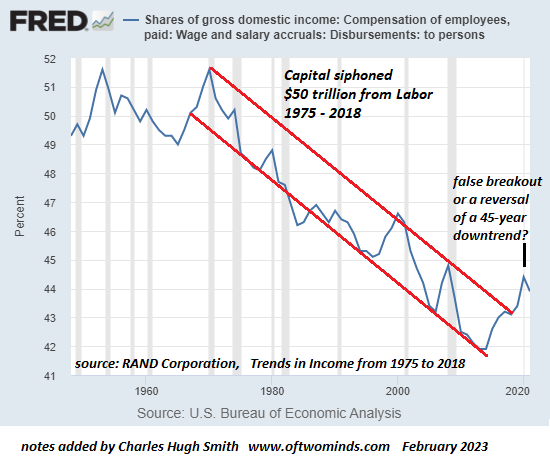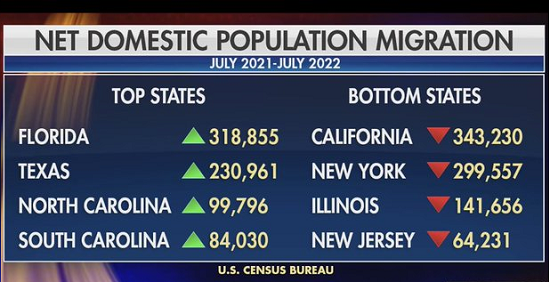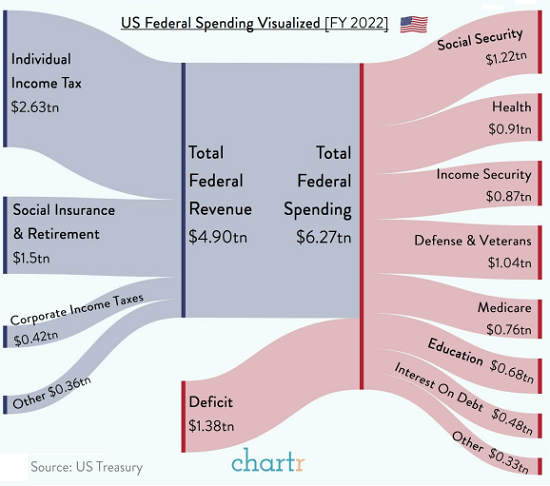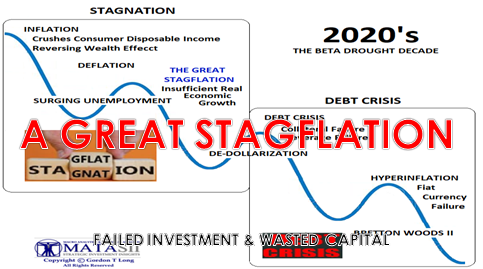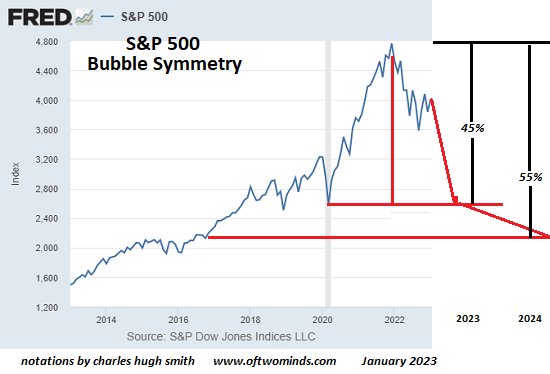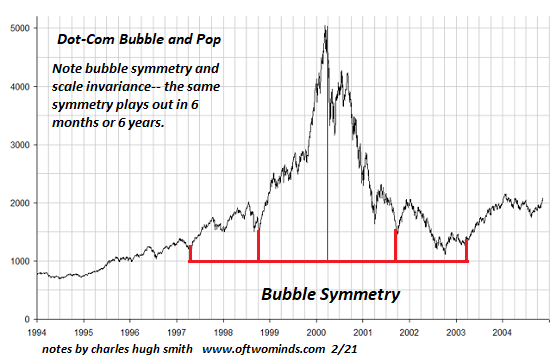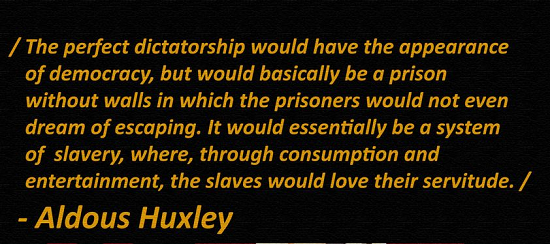Category Archive: 5.) Charles Hugh Smith
Overcapacity / Oversupply Everywhere: Massive Deflation Ahead
The price of a great many assets will crash, out of proportion to the decline in demand. Oil is the poster child of the forces driving massive deflation: overcapacity / oversupply and a collapse in demand. Overcapacity / oversupply and a collapse in demand are not limited to the crude oil market; rather, they are the dominant realities in the global economy.
Read More »
Read More »
Between a Rock and a Hard Place: Pandemic and Growth
There is no way authorities can limit the coronavirus and restore global growth and debt expansion to December 2019 levels. Authorities around the world are between a rock and a hard place: they need policies that both limit the spread of the coronavirus and allow their economies to "open for business." The two demands are inherently incompatible, and so neither one can be fulfilled.
Read More »
Read More »
There’s No Going Back, We Can Only Go Forward
What I see is a global collapse of intangible capital that is invisible to most people. It's only natural that the conventional expectation is a return to the pre-pandemic world is just a matter of time. Whether it's three months or six months or 18 months, "the good old days" will return just as if we turned back the clock.
Read More »
Read More »
Buy The Tumor, Sell the News
The fictitious valuation of the stock market will eventually re-connect with reality in a violent decline. No, buy the tumor, sell the news (tm) is not a typo: the stock market is a lethal tumor in our economy and society.
Read More »
Read More »
The World Has Changed More Than We Know
Put another way: eras end. While the mainstream media understandably focuses on the here and now of the pandemic, some commentators are looking at the long-term consequences. Here is a small sampling: While each of these essays offers a different perspective, let's focus on the last two: Ugo Bardi's essay on Hyperspecialization and the technological responses described in the MIT Technology Review essay.
Read More »
Read More »
If Lockdown Is a Needless Over-Reaction, Then Why Did China Lockdown Half its Economy?
Recall that the initial deaths and related costs are only the first-order effects; policy makers have to consider the second-order effects. Everyone who reckons that the lockdown is needless and more destructive than the pandemic that triggered it has to answer this question: then why did China lockdown half its economy?
Read More »
Read More »
When Bulls Are Over-Anxious to Catch the Rocketship Higher, This Isn’t the Bottom
Everyone with any position in today's market will be able to say they lived through a real Bear Market. In the echo chamber of a Bull Market, there's always a reason to get bullish: the consumer is spending, housing is strong, the Fed has our back, multiples are expanding, earnings are higher, stock buybacks will push valuations up, and so on, in an essentially endless parade of self-referential reasons to buy, buy, buy and ride the rocketship...
Read More »
Read More »
The Wonderful Insanity of Globalization
So here's an April Fools congrats to globalization's many fools. The tradition here at Of Two Minds is to make use of April Fool's Day for a bit of parody or satire, but I'm breaking with tradition and presenting something that is all too real but borders on parody: the wonderful insanity of globalization.
Read More »
Read More »
The New (Forced) Frugality
There are only two ways to survive a decline in income and net worth: slash expenses or default on debt. In post-World War II America, the cultural zeitgeist viewed frugality as a choice: permanent economic growth and federal anti-poverty programs steadily reduced the number of people in deep economic hardship (i.e. forced frugality) and raised the living standards of those in hardship to the point that the majority of households could choose to be...
Read More »
Read More »
The Pandemic Is Accelerating the Breakdown That Began a Decade Ago
The feedback loop has reversed: by saving more, people will spend, borrow and speculate less, draining the fuel from any broadbased expansion. In eras of confidence and certainty, people save less and spend more freely.
Read More »
Read More »
Helicopter Money: Short-Term Relief Won’t Cure our Financial Disease
The collateral supporting the global mountain of debt is crumbling as speculative bubbles deflate. A great many freebies are being tossed in the Helicopter Money basket. That households experiencing declines in income need immediate support is obvious, as is the need to throw credit lifelines to small businesses.
Read More »
Read More »
The System Will Not Return to “Normal,” and That’s Good; We Can Do Better
Essential home lockdown reading. The pandemic is revealing to all what many of us have known for a long time: the status quo was designed to fail and so its failure was not just predictable but inevitable. We've propped up a dysfunctional, wasteful and unsustainable system by pouring trillions of dollars in borrowed money down a multitude of ratholes to avoid a reckoning and a re-set.
Read More »
Read More »
The Global Repricing of Assets Can’t Be Stopped
All bubbles pop, period. The financial elites are pushing a narrative that asset prices, sales and profits will all return to January 2020 levels as soon as the Covid-19 pandemic fades. Get real, baby. Nothing is going back to January 2020 levels. Rather than the "V-shaped recovery" expected by Goldman Sachs et al., the crash in asset prices will eventually gather momentum.
Read More »
Read More »
Covid-19 Helicopter Money: Go Big Now or Go Home
This is why it's imperative to go big now, and make plans to sustain the most vulnerable households and small employers not for two weeks but for six months--or however long proves necessary. That governments around the world will be forced to distribute "helicopter money" to keep their people fed and housed and their economies from imploding is already a given.
Read More »
Read More »
The Covid-19 Dominoes Fall: The World Is Insolvent
Subtract their immense debts and they have negative net worth, and therefore the market value of their stock is zero. To understand why the financial dominoes toppled by the Covid-19 pandemic lead to global insolvency, let's start with a household example. The point of this exercise is to distinguish between the market value of assets and net worth, which is what's left after debts are subtracted from the market value of assets.
Read More »
Read More »
Goodbye to All That: The Demise of Globalization and Imperial Pretensions
The decline phase of the S-Curve is just beginning. Globalization and Imperial Pretensions have been decaying for years; now the tide has turned definitively against them. The Covid-19 pandemic didn't cause the demise of globalization and Imperial Pretensions; it merely pushed the rickety structures over the edge.
Read More »
Read More »
And Then Came the Lawsuits: Pandemic in a Litigious Society
This is the upside of hyper-litigiousness: prevention is prioritized as the most effective means of limiting future liability. Never mind prevention or vaccines; the big question is "who can we sue after this blows over to rake in millions of dollars?" Yes, this is pathetic, tragic, perverse and evil, but that's reality in a hyper-litigious society like the U.S.
Read More »
Read More »
What the Fed Can Do: Print and Buy, Buy, Buy
Everyone with a pension fund or 401K invested in stocks better hope the Fed becomes the buyer of last resort, and soon. Much has been written about what the Federal Reserve cannot do: it can't stop the Covid-19 pandemic or reverse the economic damage unleashed by the pandemic.
Read More »
Read More »
The Gathering Storm: Could Covid-19 Overwhelm Us in the Months Ahead?
Either the science is wrong and the complacent will be proven correct, or the science is correct and the complacent will be wrong. The present disconnect between the science of Covid-19 and the status quo's complacency is truly crazy-making, as we face a binary situation: either the science is correct and all the complacent are wrong, or the science is false and all the complacent are correct that the virus is no big deal and nothing to fret about.
Read More »
Read More »
Did Covid-19 Just Pop All the Global Financial Bubbles?
Once confidence and certainty are lost, the willingness to expand debt and leverage collapses. Even though the first-order effects of the Covid-19 pandemic are still impossible to predict, it's already possible to ask: did the pandemic pop all the global financial bubbles? The reason we can ask this question is the entire bull mania of the 21st century has been based on a permanently high rate of expansion of leverage and debt.
Read More »
Read More »










